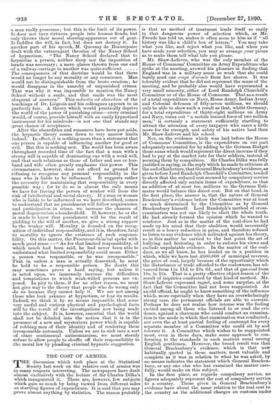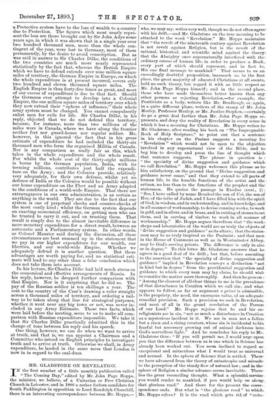THE COST OF ARMIES. -T HE discussion which took place at
the Statistical Society last week on the relative cost of armies was in many respects interesting. The newspapers have dealt almost exclusively with the lecture of Sir Charles Mike's which inaugurated it. There are, however, few subjects which gain so much by being viewed from different sides as startling figures of expenditure. It is said that you may ,prove almost anything by statistics. The reason probably is that no method of treatment lends itself so easily to that dangerous power of selection which, as Mr. Fronde has told us, makes it often seem to him as if " all history was like a child's box of letters." You may take what you like, and reject what you like, and when you have made your selection, you may so arrange your pieces as to make them tell what tale you please.
Mr. Shaw-Lefevre, who was the only member of the House of Commons' Committee on Army Expenditure who spoke at the meeting, avowed his pleasure in finding that England was in a military sense so weak that she could barely send one corps cram& from her shores. It was tolerably evident that he did not represent the sense of the meeting, and he probably also would have represented a very small minority, either of Lord Randolph Churchill's Committee or of the House of Commons. That as a result of a total expenditure on Navy, Home Army, Indian Army, and Colonial defences of fifty-seven millions, we should only be able to show such a result as that, whilst Germany, for a total expenditure of thirty-eight millions on Army and Navy, turns out " a mobile trained force of two million men," is certainly a statement sufficiently startling to attract the attention of every taxpayer who cares a little more for the strength and safety of his native land than Mr. Shaw-Lefevre and his school.
Nor, on the evidence which was laid before the House of Commons' Committee, is the expenditure on our part adequately accounted for by adding to the German Budget those sums which would represent the direct increase if they had to pay at the market rate for their soldiers, instead of securing them by compulsion. Sir Charles Dilke was fully justified in saying, in the reply which he made to criticism at the end of hislecture, that General Brackenbury's evidence, as given before Lord Randolph Churchill's Committee, tended to show that the reduced cost secured by compulsory service directly affected only certain items of expenditure, so that an addition of at most ten millions to the German Esti- mates would balance this direct cost. But on that head, in the first place, the answer is, that the nature of General Brackenbury's evidence before the Committee was at least as much determined by the Committee as by General Brackenbury himself. Lord Randolph's method of cross- examination was not one likely to elicit the whole truth. He had already formed the opinion which he wanted to reinforce. Just as in the matter of the coal-dues he had made up his mind that their abolition would necessarily result in a heavy reduction in price, and therefore refused to listen to any evidence which militated against his theory, so in this matter he carried to the last point the art of bullying and hectoring in order to enforce his views and exclude unpalatable evidence. In the matter of the coal- dues, as we all know, he has landed us in a position in which, while we have lost £500,000 of municipal revenue, the price of coal, largely because of the opportunity which the disturbance of trade afforded to the coalowners, has ad- vanced from 15s. 11d. to 19s. 6d., and that of gas-coal from 10s. to 16s. That is a pretty effective object-lesson of the result of inquiries conducted by that kind of method. Mr. Shaw-Lefevre expressed regret, and some surprise, at the fact that the Committee had not been reappointed. As an old official, he ought to know something of the influence which, more especially when they have an overwhelmingly strong case, the permanent officials are able to exercise. Perhaps he does not realise how intense was the feeling excited among all those who listened to or read the evi- dence, against a chairman who could conduct an examina- tion in the mode in which that examination was conducted; nor even the at least partial feeling of contempt for every separate member of a Committee who could sit by and tolerate it. A Committee which wishes to be reappointed must, even in these days, make some approach to con- forming to the standards in such matters usual among English gentlemen. However, the broad result was that General Brackenbury's evidence, which is that now habitually quoted in these matters, most valuable and complete as it was in relation to what he was asked, by no means indicates the statement which General Bracken- bury, or any one else who has examined the matter care- fully, would make on this subject. In the first • place, as regards compulsory service, no figures adequately represent the cost of compulsory service to a country. Those given in General Brackenbury's evidence have about the same relation to the real cost to the country as the additional charges on customs under a Protective system have to the loss of wealth to a country due to Protection. The figures which most nearly repre- sent the loss are those brought out by Sir John Adye some years ago, in which it was shown that in a single year over two hundred thousand men, more than the whole con- tingent of the year, were lost to Germany, most of them permanently, by the desire to avoid conscription. But as was said in answer to Sir Charles Dilke, the conditions of the two countries are much more nearly represented statistically by the fact that, whereas the British Empire which we have to defend extends over nine million square miles of territory, the German Empire in Europe, on which the whole expenditure is at present incurred, covers only two hundred and eleven thousand square miles. The English Empire is thus forty-five times as great, and most of our excess of expenditure is due to that fact. Should the Germans ever attempt to develop into a Colonial Empire, the one million square miles of territory over which they now extend their " sphere of influence," their whole army system must be changed. You cannot compulsorily enlist men for exile for life. Sir Charles Dilke, in his reply, objected that we do not defend this territory, because, for instance, more than two millions of the miles were in Canada, where we have along the frontier neither fort nor guard-house nor regular soldier. He, however, in this ignored the fact that in his gross estimate of expenditure he had included the thirty-six thousand men who form the organised Militia of Canada. Nor is any comparison so really fair as this, which takes in the whole expenditure and the whole result. For whilst the whole cost of the thirty-eight millions is borne by the German population, India, with its teeming millions, contributes just half the expendi- ture on the Army ; and the Colonies provide, relatively very adequately, for their own defence, whilst yet no defence of India or the Colonies would be possible without our home expenditure on the Fleet and an Army adapted to the conditions of a world-wide Empire. That there are extravagances in our own administration, is as certain as anything in the world. They are due to the fact that our system is one of perpetual checks and counter-checks of the most costly kind ; whilst the German system depends on exacting economical efficiency, on getting men who can be trusted to carry it out, and on trusting them. That result is simply due to the almost inevitable difference in mere monetary expenditure for a direct result, between an autocratic and a Parliamentary system. In other words, as Colonel Maurice said during the discussion, all these circumstances are best summed up in the statement that we pay in our higher expenditure for our wealth, our liberties, and our world-wide Empire. Whether we adequately defend it is another question. But these advantages are worth paying for, and no statistical esti- mate will lead to any other than a false conclusion which does not take them into account.
In his lecture, Sir Charles Dilke had laid much stress on the economical and effective arrangements of Russia. In his reply, however, he dropped further comparison with that Empire. Nor is it surprising that he did so. The pay of the Russian soldier is ten shillings a year. The cost to the country of the Czar's drawing a ruler straight across a thousand miles of territory, and ordering a rail- way to be taken along that line for strategical purposes, whether it went near any big town or not, was never in- cluded in any Army Estimate. Those two facts, which were laid before the meeting, seem to us to make all com- parison with Russian expenditure impossible. We take it that Sir Charles Dilke practically admitted this in the change of tone between his reply and his speech.
One thing, however, we can do when we want to arrive at truth, and that is, we can appoint a Chairman and a Committee who intend on English principles to investigate truth and to arrive at truth. Otherwise we shall, in Army expenditure, be landed in the same mess that London is now in in regard to the coal-dues.



































 Previous page
Previous page